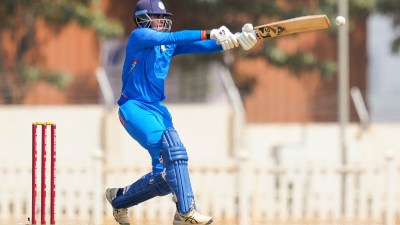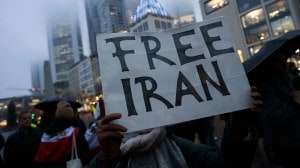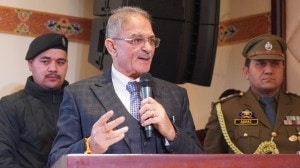A pointless exercise
One of India's main objectives at the recently concluded meeting of the nonaligned foreign ministers at Cartagena in Columbia seems to hav...

One of India8217;s main objectives at the recently concluded meeting of the nonaligned foreign ministers at Cartagena in Columbia seems to have been to isolate Pakistan and to prepare the ground, if possible, to expel Pakistan from the membership of the movement. Incidentally, it was India which facilitated Pakistan8217;s joining the movement at the nonaligned summit in Havana in 1979, barely two years after General Zia-ul-Haq had overthrown the democratically elected government of Zulfiqar Ali Bhutto.
Jaswant Singh in his policy statement at Cartagena argued that adherence to democracy should be a criterion for membership of the movement and that the regimes which capture power from democratic governments through unconstitutional means should have no place in it. This sentiment has, perhaps, found expression in a paragraph of the draft declaration to be adopted at the next nonaligned summit to be held in Dhaka in a year8217;s time.
Indian media had banner headlines on Tuesday last which, as usual, were euphoric without historical memory and political realism. There was even an editorial in one of the newspapers, titled General Quarantine8217;, where the view was expressed that Pakistan has failed to understand that world has changed and that the likelihood is that of its complete isolation. One would not go by resolutions at the unilateral fora like NAM to assess the validity of this prognosis. Whether Pakistan gets isolated or not will have to be judged by the substance of General Musharraf and his government8217;s interaction with foreign governments and multilateral organisations with more substance and influence.
Some procedural and political questions have to be clarified before claiming a diplomatic victory. The point to remember is diplomacy and victory are contradictory terms. Good diplomacy does not aim at victory, but furtherance and consolidation of national interests through political means based on reason and negotiations.
The paragraph included in the draft declaration states: 8220;We welcome the decision of the Organisation of African Unity in Algiers in July 1999, calling for the restoration, before the next OAU summit of constitutional legality in states, whose governments have come to power through unconstitutional means. We strongly recommend that this issue be considered by the movement at the next summit.8221; The first question is whether we suggested this draft paragraph which was accepted by the Cartagena conference in general terms to avoid controversy? If not, was the paragraph the result of consultations in the drafting committee of the conference on the basis of the recommendations of a number of countries? Did the 49 or 50 members of the Organisation of Islamic Countries, many of whom are ruled by one-party governments, or monarchies, really accept this paragraph or just went along with it because it does not mention any particular government by name and it is only recommendatory to be considered at the nextsummit.
Leaving aside Pakistan, how did the delegations of Myanmar and Ivory Co-ast, countries with whom India had good relations, react to the inclusion of the above paragraph in the declaration? And finally, is the next summit going to expel Myanmar, Ivory Coast and Pakistan, because Pakistan alone cannot be expelled if the criteria of democracy is to be applied impartially? There is also the need to ponder on three political implications of what has been suggested or recommended. Will the expulsion from the movement, if it takes place at all, result in Pakistan really being isolated from linkages which are of substantive interest to Pakistan, i.e. with the OIC, with the USA, with China and, by implications, with multilateral financial institutions? This is not going to happen if General Musharraf undertakes an assiduous effort to establish his government8217;s credibility as a responsible and mature entity, an effort which is already underway.
Secondly, will the movement, which is already fr-ail and subject to inner contradictions, be able to withstand pressure generated by such expulsions? Most importantly, while it may be in India8217;s interest to generate pressure on the Musharraf government, trying to engineer its isolation, this is a short-term interest. Is it politically worthwhile to isolate Pakistan in the long-term, in terms of stability and peace in the region? One is talking about Pakistan as a country, and not of the Musharraf government.
One has yet to see if the OIC at its next meeting in Qatar will really refrain from passing critical resolutions which affect the welfare of 8220;the umma, the pan-Islamic community in different parts of the world. Or would the OIC8217;s response be to take less interest in the nonaligned movement and focus on its own specific objectives and on intensely shared concerns and issues. One impression of India8217;s focussing on Pakistan8217;s membership of the movement is that the leitmotif of our stance was Pakistan-specific, rather than a general intellectual and emotional commitment to democracy.
India has dealt with General Suharto, General Zia-ur-Rehman, General Ershad, General Rawlings of Ghana and with assorted regimes in Africa and South America which came to power through coups, as members in the nonaligned movement. This approach of not interfering in the internal affairs of member countries characterised our approach even during the post-cold war decade which is coming to an end, when democracy and good government became active items on the international agenda. Another question is, how do we reconcile our opposition to humanitarian interventions in the internal affairs of states backed by the UN Secretary General, when we declare our categorical opposition to dictatorial regime which may be denying human rights to their own citizens? Our foreign minister8217;s statement and the consequent conceptual acceptance of his advocacy by the Cartagena Conference is a qualitative departure from the traditions of the nonaligned movement, in that the movement never passed value judgments or suggestedpunitive action against any member country on the basis of the acceptability or unacceptability of its internal affairs.
The decision of the last Commonwealth summit and the OAU were quoted as precedents for our approach. Should not some thought be given to whether the resolutions of these two bodies really resulted in the isolation of any African country or Pakistan? This does not seem to be the case. This is not to argue that India should not take a firm stance against the regime headed by an individual who imposed war on us last year and who continues to support terrorism against India. The primary orientation in this respect should be in the bilateral context. Multilateral exercise to generate pressure on Pakistan have to be more carefully calibrated, making an assessment whether our multilateral initiatives will really make an impact on the substantive orientations of Pakistan8217;s policies, towards India.
- 01
- 02
- 03
- 04
- 05































